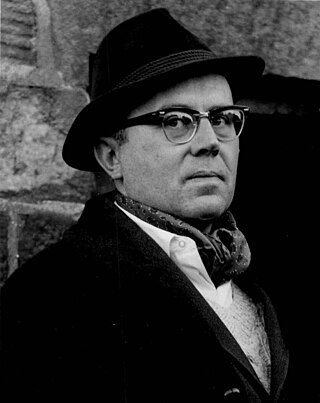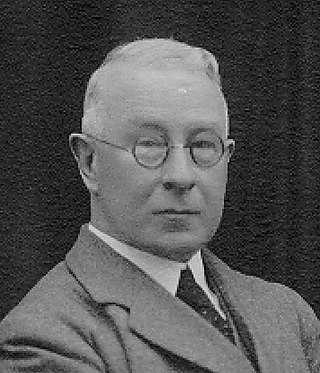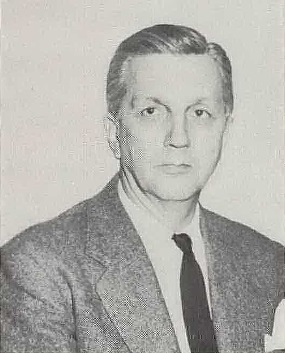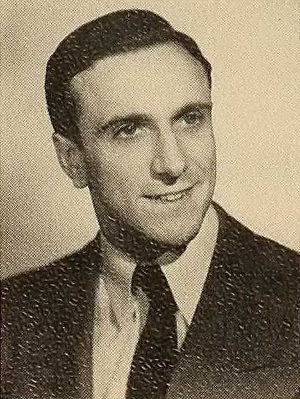Ross John Swartz Hoffman (February 2, 1902 - December 16, 1979) was an American historian, writer, educator, and conservative intellectual who specialized in Modern European History and International Affairs.
Ross John Swartz Hoffman (February 2, 1902 - December 16, 1979) was an American historian, writer, educator, and conservative intellectual who specialized in Modern European History and International Affairs.
Born on February 2, 1902, in Harrisburg, Pennsylvania, Hoffman attended Lafayette College (A.B., 1923) and the University of Pennsylvania (M.A., 1926; Ph.D., 1932). His doctoral dissertation ("Great Britain and the German Trade Rivalry, 1875-1914"), prepared under the supervision of William Ezra Lingelbach, was published by the University of Pennsylvania Press in 1933 and received the George Louis Beer Prize from the American Historical Association in 1934.
Hoffman began his teaching career at New York University, where he was an Instructor (1926-1933) and then Assistant Professor of History (1933-1938). Hoffman had initially rejected the Protestant Christianity that he was raised in by his parents, who were of German descent, and was instead attracted to Socialism. [1] However, the study of history, as well as traveling throughout Europe, observing world events in the 1920s, and a thorough reading of scripture led him he to convert to Roman Catholicism in 1931. [1] [2] He described his conversion in his book, Restoration (Sheed, 1934). In the introduction that he contributed to Peter Guilday (ed.), The Catholic Philosophy of History (P. J. Kenedy, 1936), Hoffman noted (page ix) that, "Strictly speaking, the Catholic faith is not the philosophy of history, but it gives light to see the meaning of history; it does not reveal or explain the whole structure of the process, but it does point the direction and the end. Without this light man is blind and the historical process, in the last analysis, is an impenetrable mystery; with it, man may see a little way at least into the reason that lies hidden."
When the Rev. Robert I. Gannon, President of Fordham University, a Jesuit institution, approached Hoffman about joining the History faculty at Fordham, he agreed. At Fordham, he began as an Associate Professor (1938-1944) and then Professor of History (1944-1967). He was made Professor Emeritus in 1967. [3]
Hoffman was married to Hannah Elizabeth McCruden (1926), and they had one child. [3]
Hoffman published articles and books on both current and historical events, and contributed to a short-lived conservative journal, The American Review. He condemned Fascism in the 1920s and 30s, and then Communism in the 1950s and 60s. Unlike his Fordham colleague Charles C. Tansill, who was an isolationist and who argued against American involvement in the Second World War, Hoffman argued for American intervention on conservative and Christian grounds. [2]
Several of Hoffman's books dealt with world events: The Will to Freedom (Sheed, 1935); Tradition and Progress, and Other Historical Essays in Culture, Religion, and Politics (Bruce Books, 1938); The Organic State: An Historical View of Contemporary Politics (Sheed, 1939); The Great Republic: A Historical View of the International Community and the Organization of Peace (Sheed, 1942); (with C. G. Haines) Origins and Background of the Second World War (Oxford University Press, 1943; 2nd edition, 1947); Durable Peace: A Study in American National Policy (Oxford University Press, 1944); and The Spirit of Politics and the Future of Freedom (Bruce Books, 1951). He also co-authored (with Gaetano L. Vincitorio and Morrison V. Swift) a textbook, Man and His History: World History and Western Civilization (Doubleday, 1958; revised ed., 1963). [3]
Hoffman is often cited as helping to revive American academic interest in Edmund Burke, and published two books on the British statesman: (with A. Paul Levack) Burke's Politics: Selected Writings and Speeches on Reform, Revolution, and War (Knopf, 1949); and Edmund Burke, New York Agent, with His Letters to the New York Assembly and Intimate Correspondence with Charles O'Hara, 1761-1776 (American Philosophical Society, 1956). He also contributed to Peter J. Stanlis (ed.) The Relevance of Edmund Burke (P. J. Kenedy, 1964).
Hoffman's final book was The Marquis: A Study of Lord Rockingham, 1730-1782 (Fordham University Press, 1973). He was the recipient of a Festschrift from former students and other admirers, Crisis in the "Great Republic": Essays Presented to Ross J. S. Hoffman, edited by Gaetano L. Vincitorio and James E. Bunce et al. (Fordham University Press, 1969).
Historian John P. McCarthy credits Hoffman with two significant contributions to the American conservative movement, writing that "he worked to broaden it from an essentially non-conservative emphasis on American uniqueness ... [and] helped conservatives identify the American constitutional heritage with an older tradition of limitations on government dating back through medieval times," as well as leaving "a deep impression on many first generation American graduate students about the depth of their Catholic and European heritage." [2]
Hoffman was the recipient of honorary degrees from Villanova College (D.Litt., 1936); Marquette University (LL.D., 1937); Fordham University (LL.D., 1947); St. John's University (LL.D., 1970); University of Detroit (L.H.D., 1950); and the National University of Ireland (Litt.D., 1957). He was President of the American Catholic Historical Association during 1938-1939, and received the King Award from U.S. Catholic Historical Society in 1975. [3]

Edmund Burke was an Anglo-Irish statesman and philosopher who spent most of his career in Great Britain. Born in Dublin, Burke served as a member of Parliament (MP) between 1766 and 1794 in the House of Commons of Great Britain with the Whig Party.

Russell Amos Kirk was an American political philosopher, moralist, historian, social critic, literary critic, and author, known for his influence on 20th-century American conservatism. His 1953 book The Conservative Mind gave shape to the postwar conservative movement in the U.S. It traced the development of conservative thought in the Anglo-American tradition, giving special importance to the ideas of Edmund Burke. Kirk was considered the chief proponent of traditionalist conservatism. He was also an accomplished author of Gothic and ghost story fiction. He is often considered one of the most significant conservative men of letters of the twentieth century.

Edmund Aloysius Walsh was an American Roman Catholic priest of the Society of Jesus and career diplomat from South Boston, Massachusetts. He was also a professor of geopolitics and founder of the Georgetown University School of Foreign Service, the first school for international affairs in the United States. He founded the school in 1919, six years before the U.S. Foreign Service existed, and served as its first regent.

John Dawson Gilmary Shea was a writer, editor, and historian of American history in general and American Roman Catholic history specifically. He was also a leading authority on aboriginal native Americans in the United States. He is regarded as the "Father of American Catholic History".

Louis Francis Budenz was an American activist and writer. He began as a labor activist and became a member of the Communist Party USA. In 1945, Budenz renounced Communism and became a vocal anti-Communist, appearing as an expert witness at governmental hearings and writing about his experiences.
Bruce P. Frohnen is a Professor of Law at Ohio Northern University College of Law, where he teaches courses in Public and Constitutional Law, Jurisprudence, and Legal Profession.

Lawrence Henry Gipson was an American historian, who won the 1950 Bancroft Prize and the 1962 Pulitzer Prize for History for volumes of his magnum opus, the fifteen-volume history of "The British Empire Before the American Revolution", published 1936–70. He was a leader of the "Imperial school" of historians who studied the British Empire from the perspective of London, and generally praised the administrative efficiency and political fairness of the Empire.
Robert Alexander Nisbet was an American conservative sociologist, a professor at the University of California, Berkeley, vice-chancellor at the University of California, Riverside, and an Albert Schweitzer Professor at Columbia University.
Events from the year 1747 in Ireland.
Traditionalist conservatism, often known as classical conservatism, is a political and social philosophy that emphasizes the importance of transcendent moral principles, manifested through certain posited natural laws to which it is claimed society should adhere. It is one of many different forms of conservatism. Traditionalist conservatism, as known today, is rooted in Edmund Burke's political philosophy, which represented a combination of Whiggism and Jacobitism, as well as the similar views of Joseph de Maistre, who attributed the rationalist rejection of Christianity during previous decades of being directly responsible for the Reign of Terror which followed the French Revolution. Traditionalists value social ties and the preservation of ancestral institutions above what they perceive as excessive rationalism and individualism. One of the first uses of the phrase "conservatism" began around 1818 with a monarchist newspaper named "Le Conservateur", written by Francois Rene de Chateaubriand with the help of Louis de Bonald.

Fossey John Cobb Hearnshaw was an English professor of history, specializing in medieval history. He was noted for his conservative interpretation of the past, showing an empire-oriented ideology in defence of hierarchical authority, paternalism, deference, the monarchy, Church, family, nation, status, and place. He was a Tory Democrat who sought to realize Disraeli's goal of preserving invaluable historic traditions while encouraging timely reforms. He believed that a meritocratic, small, effective elite should lead the weaker majority.

Justin McCarthy, 1st Viscount Mountcashel, PC (Ire), was a Jacobite general in the Williamite War in Ireland and a personal friend of James II. He commanded Irish Army troops during the conflict, enjoying initial success when he seized Bandon in County Cork in 1689. However, he was defeated and captured at the Battle of Newtownbutler later in the same year. He escaped and was accused of having broken parole. After the end of the war, he led an Irish Brigade overseas for service in the French Army. He died in French exile.

Callaghan MacCarty, 3rd Earl of Clancarty was the second son of Donough MacCarty, 1st Earl of Clancarty. Callaghan was destined for a Catholic religious career and entered a seminary in France where his family was in exile during Cromwell's rule. When his elder brother died in the Battle of Lowestoft, and the 2nd Earl, his nephew, died in infancy, he unexpectedly left his religious institution, returned to Ireland, and assumed the title. He became a Protestant and married a Protestant wife. Late in life he converted back to Catholicism.
Donald Angus Cameron, publicly known by his middle name, was an American book editor and publisher. Cameron scored his first success handling The Joy of Cooking by Irma Rombauer for Indianapolis publisher Bobbs-Merrill Company in 1936. He moved to Little, Brown and Company in 1938.
William Denis Griffin was an American historian, author, and educator who specialized in Modern European History, particularly Anglo-Irish political and social history in the eighteenth and nineteenth centuries, Irish history, and the revolutionary era.

Borisz de Balla, also known as Borisz Balla de Iregh, was a Hungarian journalist, historian, diplomat, novelist, and educator who taught in the United States after World War II.

James Edward Bunce was an American historian, author, and educator who specialized in British and American colonial history.

Gaetano Leonard "Tom" Vincitorio was an American historian, author, and educator who specialized in Modern European History, particularly the British politician Edmund Burke.
Traditionalist conservatism in the United States is a political, social philosophy and variant of conservatism. It has been influenced by thinkers such as John Adams and Russell Kirk.
Peter James Stanlis was an American academic noted for his work on Edmund Burke and Robert Frost.